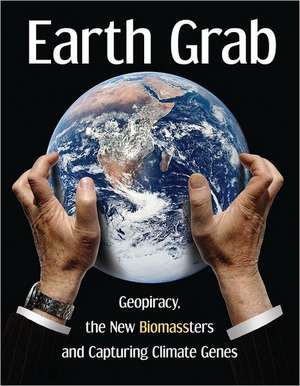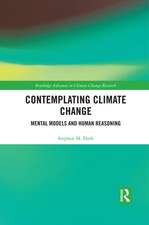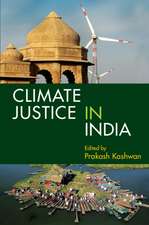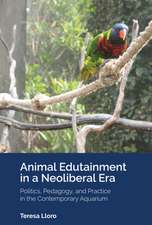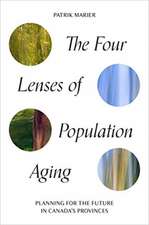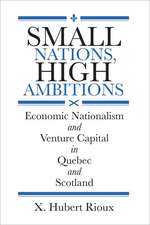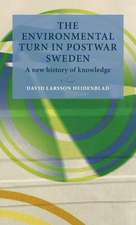Earth Grab: Geopiracy, the New Biomassters and Capturing Climate Genes
Autor Diana Bronson, Etc Groupen Limba Engleză Paperback – 31 oct 2011
Preț: 184.16 lei
Nou
Puncte Express: 276
Preț estimativ în valută:
35.24€ • 38.27$ • 29.60£
35.24€ • 38.27$ • 29.60£
Carte tipărită la comandă
Livrare economică 22 aprilie-06 mai
Preluare comenzi: 021 569.72.76
Specificații
ISBN-13: 9780857490445
ISBN-10: 0857490443
Pagini: 184
Dimensiuni: 216 x 279 x 10 mm
Greutate: 0.44 kg
Ediția:New.
Editura: Pambazuka Press
ISBN-10: 0857490443
Pagini: 184
Dimensiuni: 216 x 279 x 10 mm
Greutate: 0.44 kg
Ediția:New.
Editura: Pambazuka Press
Notă biografică
Cuprins
Part One - Geopiracy Overview: Geopiracy: the case against geoengineering Introduction: defining geoengineering Section I: The context: technology to the rescue Technology, the UNFCCC and geoengineering How we got here: the mainstreaming of geoengineering Media blitz: increase in publications while policy makers test the waters The Lomborg manoeuvre: once climate change denier, now geoengineering devotee Geoengineering, climate change and agriculture Section 2: Geoengineering: the technologies Solar radiation management (SRM) Carbon dioxide removal and sequestration Weather modification Case studies Section 3: Governing geoengineering or geoengineering governance? Some key moments The political economy of research UK and US lead geoengineering research Experimenting with Mother Earth: small-scale geoengineering is an oxymoron Military matters Corporate connections Macho mama: geoengineering's gender bias The case for a moratorium Govern all technology, not just geoengineering technologies Part Two - Biomaassters Introduction: Beware Biomass Section 1: Here Comes the bioeconomy What is biomass? Cellulose - the wonder sugar Getting elemental - 'It's still the carbon economy, stupid' Getting geopolitical - it's all in the South Sourcing biomass - a global take Back to the future? Carbohydrate vs. hydrocarbon... From cracking oil to hacking plants Selling the switch Counting the bioma$$ economy Whose biomass? A tale of two bioeconomies Marginal lands for maximal profit A new trade in biomass - shipping chips Energy crops - changes down on the farm The carbon neutral myth A serious global 'accounting error' Trading biomass-based carbon Getting REDD-y for a grab Transferring biomass technologies - climate technology initiative The green economy - a cozy home for the bioeconomy Busting the Earth's biomass budget? Ecosystems count first Planetary boundaries for biomass extraction? Not enough biomass? Let's boost it... Geoengineering the planet with biomass The new biomass economy: 10 myths Section 2 - The Tools and Players The new bio-alchemy - tooling up for the grab Synthetic biology - the game changer for biomass What Is Switching? Conclusions: earth grab! Recommendations: towards global governance Endnotes Part Three - Capturing Climate Genes Gene giants stockpile patents on 'climate-ready' crops in bid to become 'biomassters' Patent-grab threatens biodiversity, food sovereignty Overview: the potential impact of climate change on agriculture and food systems in the South Hot pursuit: the corporate grab on climate-proof genes and patents The biotech industry's new hand? How do climate-ready crops purportedly work? Corporate R&D related to genetically engineered climate tolerant genes Patent-grabbing strategies: multi-genomes and multi-sequences New rulings attempt to curb monopoly claims on DNA sequences Examples of patents and patent applications on so-called climate-ready genes and technologies Claims extending to harvested materials Patents for the poor! public/private partnerships for the development of climate-ready crops International agricultural research responds to climate change Reality check: will it work? Corporate rhetoric vs. technical complexity Reality check Farmer resilience and adaptation Farmer-based strategies for resilience in confronting climate change Conclusion Notes Index
Recenzii
'These three groundbreaking reports pull back the curtain on disturbing technological and corporate trends that are already reshaping our world and that will become crucial battlegrounds for civil society in the years ahead.' Vandana Shiva, environmentalist and founder of Diverse Women for Diversity "Whenever I need to know how to interpret the interface of technology, environment, society and political economy, there is simply nowhere else to turn but the ETC Group. This book reflects why they are so valued." Patrick Bond, director of the Centre for Civil Society at the University of KwaZulu-Natal in Durban, South Africa "This crucial book reveals that if we aren't careful, the ecological crisis could turn into a Disaster Capitalism bonanza. Indispensable research for those with their eyes wide open." Naomi Klein, author "The Shock Doctrine" "Earth Grab explores three crucial issues, which will come to dominate environmental and human rights debates in the coming years. It is an essential resource for anyone trying to keep up with the times." George Monbiot, journalist and author "Heat: How to Stop the Planet Burning" "Earth Grab warns of the immoral, unacceptable and barefaced piracy and manipulation being unleashed on the planet by peddlers of dangerous techno fixes driven by the creed of profit and planetary colonialism. A warning we ignore at our peril." Nnimmo Bassey, Executive Director of Environment Rights Action, and Chair of Friends of the Earth International "This book is a tour de force. The authors, who are among the most competent experts, present hard, cutting-edge, scientific research in accessible language, without over-simplifying the issues. They efficiently dismantle the rhetoric of the dominant powers, who view science as being independent of social systems. The authors demonstrate that in reality these research programmes are undertaken under the control of agencies that are fully devoted to the interests of monopoly capital. Their research is conceived to grow super-profits, at the cost of destroying mother Earth and of human dignity and survival." Samir Amin, economist and Director of Forum du Tiers Monde (Third World Forum), Dakar, Senegal
